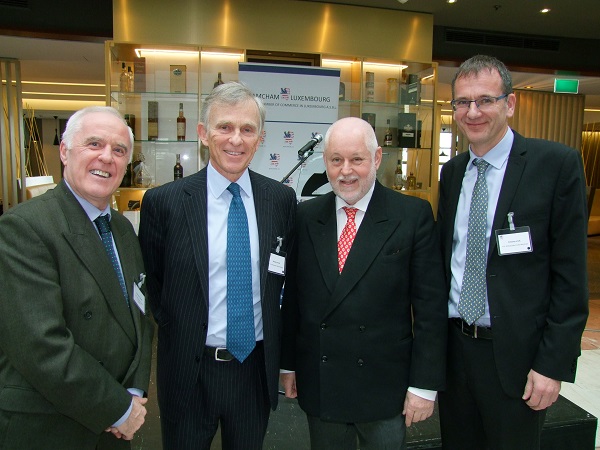
Amcham Luxembourg held its annual Christmas Luncheon on Wednesday 7 December in the atrium of the Hotel Sofitel in Luxembourg-Kirchberg with Minister Pierre Gramegna as Guest Speaker.
Paul Schonenberg, AMCHAM Chairman, acknowledged and welcomed the 200 attendees which included representatives of other international chambers active in the Grand Duchy (Irish, Polish, Indian, Cape Verdian and Slovenian) as well as The Network and other organisations. The ambassadors representing the US, the UK, Ireland, Belgium, Romania and Cape Verde also attended.
He recalled how this event has evolved into one involving many other organisations and is reflective of the diversity of Luxembourg. He said that the past year has been interesting and described the year to come as a "wild ride". He termed the Grand Duchy a "Safe Haven" and stated it is s great place to do business. He acknowledged that there are challenges but that we build bridges to connect communities. He called again for the development of mechanisms which allow the foreigners to have access and influence in the decision-making process commensurate with the considerable beneficial contributions that they have made and continue to make (a reference to voting in national elections), stating that we have earned the right to be stakeholders to enjoy the country's prosperity together (with Luxembourg nationals).
After the 3-course dinner of terrine, salmon and mignardises, Luxembourg's Minister of Finance, Pierre Gramegna, addressed the event and said that currently 47% of residents are foreigners. He said there there are no major conflicts here and the Grand Duchy does not experience any nationalistic issues.
He talked about Europe, just having returned from Brussels where he attended the Eurogroup and Ecofin conferences. He said that Greece is no longer on the agenda - the soothsayers who predicted doom for the Eurozone and Greece's economy have been proved wrong.
With growth in Europe this year around 1.5% (Luxembourg is 4%), we are on the right path. Europe's unemployment rate is now under 10% (6.4% in Luxembourg) for the first time since the financial crisis; however, people/politicians and the media are too busy talking about national issues to promote and talk up Europe.
Re the UK and the US, he said that recent decisions (Brexit, US presidential election) must be seen as a democratic vote by their citizens and the results should be respected. He called for more trade and open markets, and for more dialogue on open trade (leadign to globalisation). In many countries, the gap between rich and poor has not narrowed, in fact it has widened.
He said that Luxembourg is only one of eleven countries which are triple A rated for finance. The country has gone through three years of reform (Italy has seen great change under Matteo Renzi but people voted against him as they are afraid of change). Reforms are difficult here also, affecting all the people but not putting the burden on companies. The state budget has been balanced. VAT has been increased (socially defendable) and expensed have been reduced. He referred to the imminent tax law changes (corporate tax rate will reduce from 21% to 18%, and personal tax will also reduce).
He referred to the new green exchange at the Luxembourg Stock Exchange, and the COP meetings in Paris and Marrakesh, following which the state is implementing green changes.
He said that people in Luxembourg are shy and reserved and tend to communicate only when things are certain, unlike the UK - from which Luxembourg could learn. Luxembourg is not an island and depends on the security of the whole of Europe; in that respect we are dependent on others. But Luxembourg has built its prosperity on open markets.
On the question of possibly having private tuition fees being tax deductible, Minister Gramegna agreed to study the issue. He also stated that it is possible to follow the IB and GCSE curricula through English in some public Luxembourg schools, and confirmed that more places will be available next September in those schools, as demand rises.
He also said that he will look into tax breaks for start-ups as well as into initiatives started by France and Belgium, with EU incentives also possibly coming available. He referred to the new House of Fintech from which he expect good ideas to come, including from start-ups.
Photo (top, L-R): Peadar Carpenter, Irish Ambassador; David McKean, US Ambassador; Paul Schonenberg, AMCHAM Chairman; John Marshall, British Ambassador)








